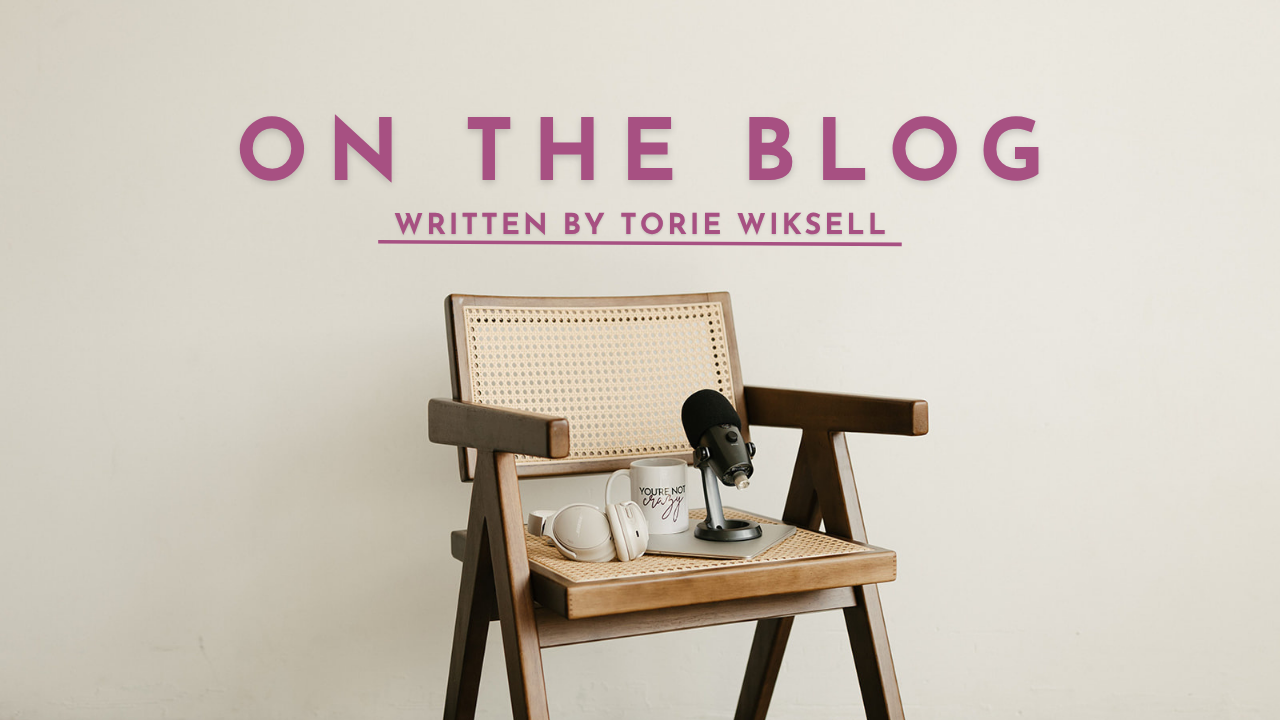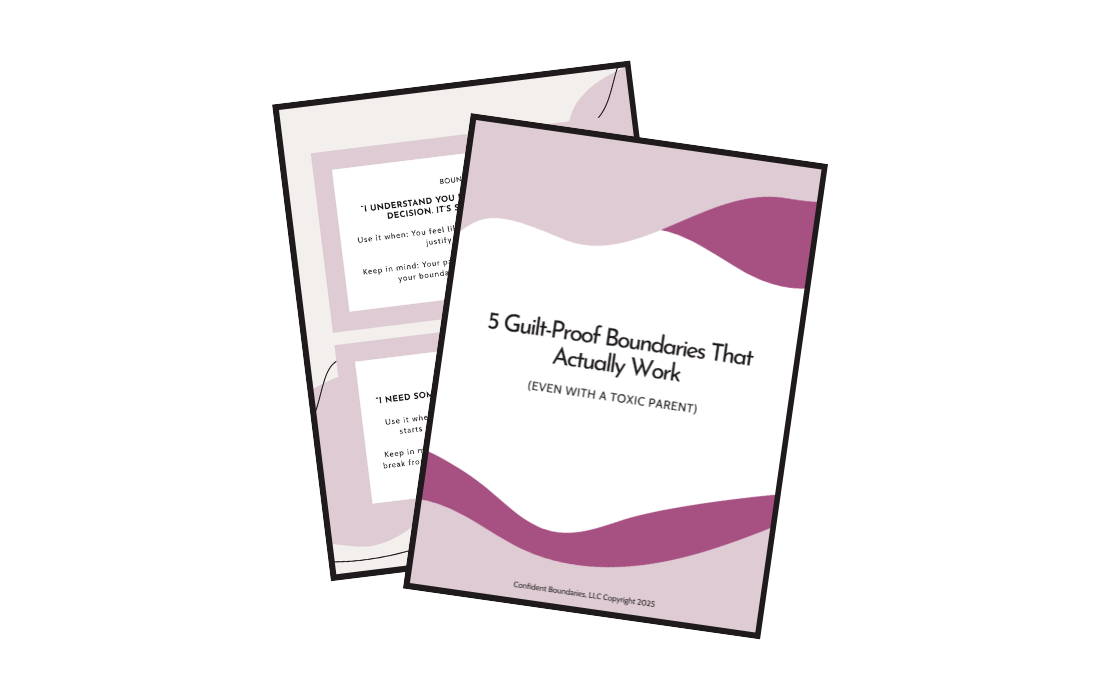
It’s Me, Hi, I’m The Problem, It’s Me.
If you grew up with a toxic mom or emotionally immature parent who had traits of borderline or narcissistic personality disorder, chances are you’ve had this thought:
"What if I’m the problem?"
I know I did.
In fact, for years, I was convinced I had borderline personality disorder. I spiraled in self-doubt, constantly analyzing my reactions and wondering if I was the one who was broken. It felt like maybe all the chaos in my family was my fault. I now know—that’s incredibly common for adult children of parents with BPD or NPD.
So if you’ve ever found yourself Googling symptoms, questioning your mental health, or wondering if your big emotions mean you’re damaged—this is for you.
Growing Up With a BPD or Narcissistic Parent Changes How You See Yourself
Here’s what a lot of people don’t talk about:
When you grow up in a dysfunctional family, especially with a BPD or narcissistic parent, you’re not just dealing with emotional abuse—you’re dealing with emotional confusion.
You're constantly being told your emotions are too much.
Or you're overreacting.
Or you’re selfish for wanting something different.
Over time, that kind of invalidation makes you question your instincts. You stop trusting your gut. You doubt your emotions. You internalize the belief that you are the problem—and that belief is incredibly hard to shake.
So if you’re struggling with self-trust or self-worth, I want you to know this:
You didn’t make this up.
You’re not being dramatic.
And you are absolutely not alone.
"Do I Have BPD?"—Here’s What I’ve Learned
As a therapist and coach who specializes in helping adult children of toxic parents, I’ve worked with so many people who—like me—have wondered if they have BPD. And while every situation is unique, I want to normalize how common this fear is.
Here’s why:
-
People with BPD can be incredibly emotionally dysregulated—and that behavior gets modeled to their kids.
-
Emotional meltdowns, black-and-white thinking, and fear of abandonment are all things you may have absorbed from your parent.
-
Feeling overwhelmed, angry, or reactive doesn’t mean you are disordered—it means you were never taught how to regulate your emotions in a safe, supportive environment.
And here’s an important distinction:
BPD is treatable. It’s rooted in emotional pain. If you have BPD, ok- you can treat that. Look for a DBT clinic near you- it's the gold-standard treatment for BPD. You are going to be ok because you are motivated to heal and willing to do the work.
I can guarantee that if you're worried about having narcissistic personality disorder because you don't want to hurt anyone you care about- you do not have narcissistic personality disorder. NPD is built around entitlement and a lack of empathy. People with NPD don’t want help because they don't think any of their behaviors are a problem.
No matter which dynamic you grew up with, the emotional scars are real. And the healing process? That’s where things start to shift.
Emotions Are Terrifying When You Were Raised to Ignore Them
If emotions feel big, scary, or out of control—you’re not broken. You were likely never taught how to sit with a feeling without being punished, gaslit, or dismissed for having it.
Emotional regulation is a skill. It’s something you can learn, even as an adult. And it starts with giving yourself permission to feel without judgment.
-
Anger doesn’t make you dangerous.
-
Sadness doesn’t make you too sensitive.
-
Wanting space doesn’t make you selfish.
What makes healing possible is creating safety around those emotions—so they can stop feeling like threats and start feeling like signals. The way you respond to an emotion (your behavior) is what is helpful/unhelpful.
Rebuilding Trust in Yourself Takes Time—But It’s Worth It
Growing up in a dysfunctional family often means your intuition got bulldozed. Maybe your toxic mom made you feel crazy for having boundaries. Maybe your narcissist dad flipped the script every time you expressed a need.
And now, trusting yourself feels dangerous.
I get it. I’ve lived it.
But you can relearn that skill. With the right support—through therapy, coaching, or community—you can rebuild your confidence and stop asking yourself, “Am I the problem?” and start saying, “That behavior was never okay.”
You Are the Cycle Breaker—and That’s Why This Feels So Damn Hard
If you’re reading this, there’s a good chance you’re the one in your family who’s choosing to wake up. To say, "This ends with me." To stop performing, stop pleasing, and start actually living.
And that is no small thing.
Being the cycle breaker means you're choosing peace over chaos, truth over silence, and boundaries over guilt. It’s painful. It’s lonely. And it’s also powerful.
You're not ruining the family. You're saving yourself.
What Healing Really Looks Like (Spoiler: It’s Not Linear)
Let me be clear—healing from emotionally immature parents doesn’t mean you never feel overwhelmed again. It doesn’t mean you’re “above” getting triggered or feeling sad. It means you recognize those moments for what they are: remnants of a childhood where you weren’t safe to just be.
Healing looks like:
-
Catching yourself in the spiral and choosing not to shame yourself
-
Asking for help even when it feels awkward
-
Practicing self-compassion instead of criticizing yourself
-
Learning to say no without over-explaining and justifying yourself
You’re Not Crazy. You’re Waking Up.
If you’re navigating the pain of surviving a toxic parent, trying to set boundaries with a narcissist mom or BPD dad, or wondering if the dysfunction you grew up in is still affecting your relationships—know this:
You are allowed to heal.
You are allowed to change.
And you’re allowed to stop being the one who keeps everything together.
You are not the problem.
You are where the healing begins.
Ready for Tools That Actually Work?
This is exactly why I created the Confident Boundaries Membership—and the $149 Boundaries Workshop that’s helped dozens of cycle breakers like you learn how to stop backtracking, stop panicking, and finally hold the line.
If you’re ready for support that gets it, start here:
-
Watch the Workshop – How to Set Boundaries That Stick (Even With a Toxic Parent)
-
Join the Membership – Tools, coaching, and community built for adult children of toxic parents
-
Download the Free Guide – 5 Boundaries That Actually Work With Toxic Parents
You’re Not Crazy.
But you might have been gaslit by your parents.
Learn how to recognize the signs—and start rebuilding trust in yourself.
I hate SPAM. I will never sell your information, for any reason.



